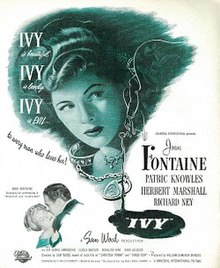Ivy *** (1947, Joan Fontaine, Herbert Marshall, Patric Knowles, Richard Ney, Cedric Hardwicke, Lucile Watson, Sara Allgood, Henry Stephenson, Una O’Connor) – Classic Movie Review 12,345
Director Sam Wood’s devilishly devious 1947 Universal Pictures black and white thriller film Ivy is based on Marie Belloc Lowndes’s 1927 novel The Story of Ivy, and stars Joan Fontaine, Herbert Marshall, Patric Knowles, Richard Ney, Cedric Hardwicke, Lucile Watson, Sara Allgood, Henry Stephenson, and Una O’Connor.
Set in Edwardian England, it is an American crime film noir mystery melodrama whose look is everything, and luckily it is designed up to the nines by its producer and set designer William Cameron Menzies, whose sets are photographed lovingly by Russell Metty.
Entertaining though Ivy is, and it is, script writer Charles Bennett does surprisingly little with Marie Belloc Lowndes’s novel considering he was Alfred Hitchcock’s collaborator on Blackmail and The 39 Steps.
Joan Fontaine stars as greedy, ruthless Ivy Lexton, who wants to get rid of both her husband Jervis (Richard Ney), a man with poor prospects, and her infatuated lover Dr Roger Gretorex (Patric Knowles), in order to marry rich Miles Rushworth (Herbert Marshall). The trouble is that Rushworth shows no interest in her because Ivy is already married, but she has a simple solution, well more of a complex solution…
Main star Fontaine is rock solid in the star role, and good value, but it’s Cedric Hardwicke as Inspector Orpington, Lucile Watson as Knowles’s mom Mrs Gretorex, and Una O’Connor as fortune-telling Mrs Thrawn that help most among a fine cast of stalwart players.
Joan Fontaine’s real-life mother Lillian Fontaine plays Lady Flora.
The song ‘Ivy’, written to promote the film by Hoagy Carmichael but not used on the soundtrack, is now a jazz standard.
It premiered on 26 June 1947 in New York City.
The film was adapted in 1951 for radio on NBC’s Screen Directors’ Playhouse, with Fontaine reprising her role.
It is made by Sam Wood Productions. Sam Wood is remembered as director of A Night at the Opera, A Day at the Races, Goodbye, Mr Chips, The Pride of the Yankees, For Whom the Bell Tolls, Kings Row (1942) and Ivy (1947).
But there is something else he is remembered for. Sam Wood became an ardent Anti-Communist in the late 1940s. In 1944, he founded, and was first president of, the Motion Picture Alliance for the Preservation of American Ideals, ‘dedicated to seeking out and expelling those people it considered traitorous to American interests.’ It lobbied the House Un-American Activities Committee to examine alleged Communists in the movie industry. Wood kept a black notebook, noting those he considered subversive. He had a fatal heart attack after a 1949 Motion Picture Alliance meeting when he ranted over a liberal screenwriter suing the group for slandering him.
The cast are Joan Fontaine as Ivy Lexton, Patric Knowles as Roger Gretorex, Herbert Marshall as Miles Rushworth, Richard Ney as Jervis Lexton, Cedric Hardwicke as Inspector Orpington, Lucile Watson as Mrs Gretorex, Sara Allgood as Martha Huntley, Henry Stephenson as Judge, Rosalind Ivan as Emily, Lillian Fontaine as Lady Flora, Molly Lamont as Bella Crail, Una O’Connor as Mrs Thrawn, Isobel Elsom as Miss Chattle, Alan Napier as Sir Jonathan Wright, Paul Cavanagh as Doctor Berwick, Lumsden Hare as Doctor Lanchester, Norma Varden as Joan Rodney, C Montague Shaw as Stevens, Matthew Boulton, James Fairfax, Bess Flowers, Mary Forbes, Holmes Herbert, Lee Lenoir, James Logan, Charles Mendl, Gavin Muir, Wyndham Standing, David Thursby, Eric Wilton, Judith Woodbury, Clive Morgan, Harry Hays Morgan, Art Foster, Gerald Hamer, Jean Fenwick, Manuel Paris and Elsa Peterson.
Four works of Marie Belloc Lowndes are adapted for the screen: The Chink in the Armour (published 1912; adapted for the screen 1922), The Lodger (1913; adapted several times), Letty Lynton (1931; adapted in 1932 as Letty Lynton starring Joan Crawford), and The Story of Ivy (1927; adapted into the 1947 film Ivy starring Joan Fontaine).
Her most famous novel, The Lodger (1913), is based on the Jack the Ripper murders of 1888,
The Lodger was filmed in 1927 by Alfred Hitchcock as The Lodger, and it was adapted again in 1932 as The Lodger, and in 1944 as The Lodger, and again as Man in the Attic (1953).
© Derek Winnert 2022 Classic Movie Review 12,345
Check out more reviews on http://derekwinnert.com


